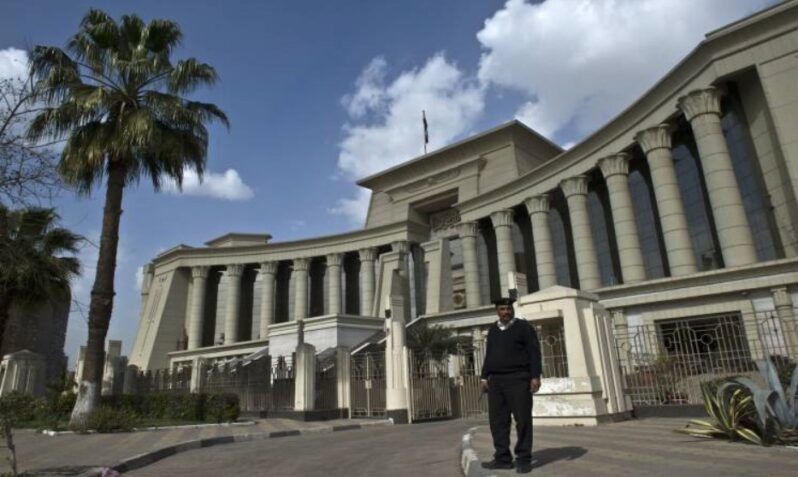Egypt Court Seek to Override Jurisdiction by International Bodies

On 18 August 2021, Egypt’s president ratified Law no. 137 of 2021 on Amending Some Provisions of the Supreme Constitutional Court Law. This law expands the court’s powers to include reviewing the constitutionality of decisions by international organizations and bodies and foreign court rulings to be executed against the state. Under the new Article 33 bis, the prime minister may petition the Supreme Constitutional Court to rule to disregard such decisions and rulings, or the obligations they entail, provided that the petition states the constitutional text allegedly contravened.[1] Although the general assembly of the Supreme Constitutional Court approved the content of these amendments without any remarks, they provoked widespread controversy in legal circles. Hence, this article addresses several pressing questions raised by the new amendments, particularly the compatibility of this unprecedented expansion with the Supreme Constitutional Court’s jurisdiction.
The Hierarchy of Legal Norms and the Nature of International Treaties: The Features of Constitutional Review in Egypt
Under the successive constitutions issued since 1971 and the 1979 Supreme Constitutional Court Law,[2] the Egyptian judicial system adopts the model of centralized review of the constitutionality of national laws and regulations. A key consequence of this choice is that the doctrine of the hierarchy of legal norms is one of the main features of judicial review of the constitutionality of laws in Egypt.[3] This article argues that the new amendments constitute an unjustified and incomprehensible deviation from this doctrine.[4] The Egyptian Constitution grants international treaties the force of “law” as soon as they are ratified and published following Parliament’s approval.[5] Hence, per the aforementioned doctrine, the Supreme Constitutional Court may review the constitutionality of treaties in accordance with the rules for challenging laws’ constitutionality.[6] In doing so, the court may examine both whether their signing, ratification, and publication satisfy procedural conditions and whether their content conforms to the Constitution.
However, under these amendments, the Supreme Constitutional Court will also have the authority to “review the constitutionality of decisions by international organizations and bodies and court rulings to be executed against the state”. The decisions in question are those issued against Egypt by the organizations and bodies established by the international treaties that Egypt has ratified.
In our view, extending judicial review to the constitutionality of such decisions inevitably means that the Supreme Constitutional Court has the power to suspend parts of international treaties (the source of these decisions’ legality) and their effects. When the Supreme Constitutional Court rules to disregard a decision issued by an international organization or body against the Egyptian state based on an agreement that has been approved by Egypt and become part of its national legislation, the ruling effectively suspends an aspect or part of that agreement, contrary to the Supreme Constitutional Court’s methodology. Explaining the importance of the organic unity of the texts of international treaties, former Supreme Constitutional Court President Awad al-Murr stated:
“An international treaty should be viewed on the basis that its provisions complement one another and are governed by an organic unity, and that the consensus on implementing their texts as a combined group was one of the core factors that the countries considered when signing, ratifying, or joining it. Hence, they may not subsequently be divided. Rather, the treaty, in the totality of its provisions, is treated as an indivisible whole”.[7]
This amendment also conflicts with the court’s function as a constitutional institution that examines the conformity of the various legal norms – not international rulings and decisions – to the national constitution. In light of this function, if the government considers a text in an international agreement to be in conflict with the Constitution then it must initiate a court case seeking a ruling that the text itself is unconstitutional rather than try to suspend the text by circumventing its effects and shirking the commitments it entails.
Moreover, adopting such an approach that allows decisions by international bodies and organizations to be suspended could severely damage Egypt’s reputation in international circles, which will frown upon its evasion of international commitments that it assumed of its own volition.[8] When the Supreme Constitutional Court reviews the constitutionality of international treaties, it takes into account the effects its rulings will have on Egypt’s relationship with other countries.[9] These effects must be considered more carefully when it comes to reviewing the “constitutionality” of decisions by international bodies and organizations because they concern obligations that the international community is expecting the Egyptian state to implement and honor.
The limits of the Supreme Constitutional Court’s jurisdiction are one of the controversial issues raised by the new amendments because of the “global” mandate they grant the court, a mandate that conflicts with its nature as fundamentally a national court. As a principle, the Constitution regulates the limits within which each authority discharges its mandate in keeping with the nature of its functions.[10] The Egyptian Constitution not only stipulates specific powers for the Supreme Constitutional Court but also allows the addition of other competences specified by law. Yet, those new competences must accord with the nature of the court’s fundamental function.[11] Reviewing the constitutionality of a decision that a body of the United Nations or African Commission on Human and Peoples’ Rights (ACHPR) issues against Egypt, or that a foreign court issues against Egyptian citizens, can by no means be understood as accordant with the nature of the function vested in the Supreme Constitutional Court.
Moreover, the court’s means of handling and examining the international decisions that the government seeks to disregard so far remains vague and raises many questions. Under the new amendments, the prime minister’s petition must state the constitutional text allegedly contravened and the ways it was contravened. How will those petitions detail the alleged “contraventions”? How will the court engage with them? And how can the court rule to disregard an international body’s decision that is based on an international agreement in legal force as part of national legislation without addressing whether the agreement itself is constitutional? Will the court’s rulings address the facts and information that prompted the international bodies to adopt these decisions and rulings? In reality, these questions cannot be answered until this law’s provisions begin to be applied. However, we must note that the Supreme Constitutional Court has previously held that “whenever the Court’s engagement with the constitutionality of the matters raised before it hinges on balances, checks, and information unavailable to it, it has deviated from its mandate”.[12] On that basis, the new competences granted to the court conflict with its established interpretation of the nature of international agreements, their status in the Egyptian legal system, and their effects.
The Philosophy and Goals of the Amendments: Protecting National Security
According to the government’s bill, the main goal of adding these competences to the Supreme Constitutional Court is to allow the state to “deal proactively, in accordance with national interests and within the framework of the Constitution and law, with any international decision that could impact Egyptian national security”.[13] According to the report issued by Parliament’s Legislative and Constitutional Affairs Committee, political changes occurring in the international arena could result in some international organizations, bodies, or courts issuing decisions and rulings against Egypt that are not based on any legal legitimacy.[14] Yet the law made no mention of the nature of these dangers to national security arising from the execution of such decisions and rulings. This suggests that a selective approach will be adopted in an attempt to suspend certain international decisions and not others. Likewise, the committee’s report lacked any explanation of why these decisions lack legal legitimacy. International bodies and organizations issue their decisions in accordance only with the internal rules and procedures governing their work, – procedures disclosed to all member states.
From another angle, the bill offered no conception of the authority of the Supreme Constitutional Court’s rulings to disregard an international body or organization’s decision. While such rulings can be invoked domestically to justify not implementing an international decision, they have no real value abroad in the face of the various international bodies. Under the Vienna Convention on the Law of Treaties, “A party may not invoke the provisions of its internal law as justification for its failure to perform a treaty”.[15]
How Do We Interpret This Unprecedented Expansion of the Supreme Constitutional Court’s Competences?
The true motive behind this unprecedented expansion of the Supreme Constitutional Court’s competences remains unclear,، especially as parts of the government’s bill were deleted during the parliamentary sessions for debating the amendments. Per the bill’s original text, the Supreme Constitutional Court could review the constitutionality of not only decisions and rulings by international organizations, bodies, and courts but also rulings by foreign arbitration bodies. Hence, many people initially thought that the main goal was to avoid executing decisions against Egypt by international arbitration bodies. In recent years, the Egyptian state incurred material losses estimated in the billions of dollars in several international commercial disputes before the World Bank’s International Centre for Settlement of Investment Disputes.[16] Because of the damage to Egypt’s reputation in international commercial circles and decline in investment opportunities that could occur if the Supreme Constitutional Court were granted the power to disregard international arbitration bodies’ rulings, Parliament agreed to delete the phrase “international arbitration bodies”. This was a positive step given those concerns, but it raises many questions about the true motive behind the amendments.
The amendments are probably a preemptive, preventative measure whereby the government seeks to justify its noncompliance with any upcoming international decisions or rulings against Egypt or Egyptian officials. These decisions will usually pertain to the human rights situation in Egypt as it is the biggest issue for which the government has attracted repeated international criticism.[17]
From another angle, the new amendments raise the issue of the execution of rulings issued by international human rights bodies and courts, particularly the ACHPR, which is the main mechanism for protecting individuals from violations by its member states.[18] Under the amendments, the court has the power to “disregard” any decision that the ACHPR issues condemning Egypt’s executive apparatuses for human rights violations. While the ACHPR’s decisions are non-binding because it is a quasi-judicial body and not a court in the legal sense, its recommendations condemning a state or urging it to remedy litigants’ damages are considered a strong indication that the violation occurred and carry much weight in international human rights circles.
This article is an edited translation from Arabic.
Keywords: Egypt, Supreme Constitutional Court, International treaties, Constitutionality
[1] “‘al-Nuwwab’ Yuwafiqu ‘ala Ta’dil Ikhtisasat al-Mahkama al-Dusturiyya fi Majmu’iha”, Al-Masry Al-Youm, 27 June 2021.
[2] Supreme Constitutional Court Law no. 48 of 1979.
[3] Yehia el-Gamal, “Hans Kelsen: al-Ab al-Ruhiyy li-l-Qada’ al-Dusturiyy”, al-Majalla al-Dusturiyya, Supreme Constitutional Court, is. 1, January 2003.
[4] According to this doctrine, the law constitutes a hierarchical set of norms, and the validity of the norms in each tier depends on the norms in the tier above it. Hence, each norm is an application of the norm above it and the basis of the norm below it.
[5] Article 151 of the 2014 Constitution.
[6] According to Supreme Constitutional Court rulings, the concept of an international treaty applies to all forms of written agreement between two or more countries regardless of whether it spans one or multiple documents. The court specifically mentioned contracts, charters, declarations, protocols, regulations, and correspondence. Supreme Constitutional Court, Case no. 30 of constitutional judicial year 17, session of 2 March 1996.
[7] Awad al-Murr, al-Raqaba al-Qada’iyya ‘ala Dusturiyyat al-Qawanin, René-Jean Dupuy Center for Law and Development, p. 337.
[8] “Adw ‘Tashri’iyyat al-Nuwwab’: Ta’dilat ‘al-Dusturiyya al-‘Ulya’” Tamassu Sum’at Misr wa-Tudi’u Haybat al-Mahkama”, Al-Masry Al-Youm, 27 June 2021.
[9] Judicial review of the constitutionality of those treaties need not be a mere legal look at their provisions. Rather, “all factors related to their signing, the circumstances they confront, and their effects on Egypt’s relationship with other countries intermesh in the assessment of them”. For more details, see Awad al-Murr, al-Raqaba al-Qada’iyya, op. cit., p. 6.
[10] Ibid., p. 21.
[11] Article 192 of the 2014 Constitution.
[12] Supreme Constitutional Court, Case no. 10 of constitutional judicial year 14, session of 19 June 1993.
[13] Constitutional and Legislative Affairs Committee report on the bill amending the Supreme Constitutional Court Law, 14 June 2021, p. 2.
[14] Ibid., p. 4.
[15] Article 27 of the Vienna Convention on the Law of Treaties, which the UN General Assembly adopted on 23 May 1969.
[16] “Ba’da Khasarat Milyarat al-Dularat fi Taswiyat al-Munaza’at: ‘al-Tahkim al-Duwaliyy’ Ayna al-Khata’!?”, Al-Masry Al-Youm, 25 October 2018.
[17] “Akthar min 30 Dawla Tudinu Intihak al-Hurriyyat fi Misr Amama Majlis Huquq al-Insan al-Tabi’ li-l-Umam al-Muttahida”, France 24, 12 March 2021.
[18] Egypt joined the ACHPR via its ratification of the African Charter on Human and Peoples’ Rights on 20 March 1984.



